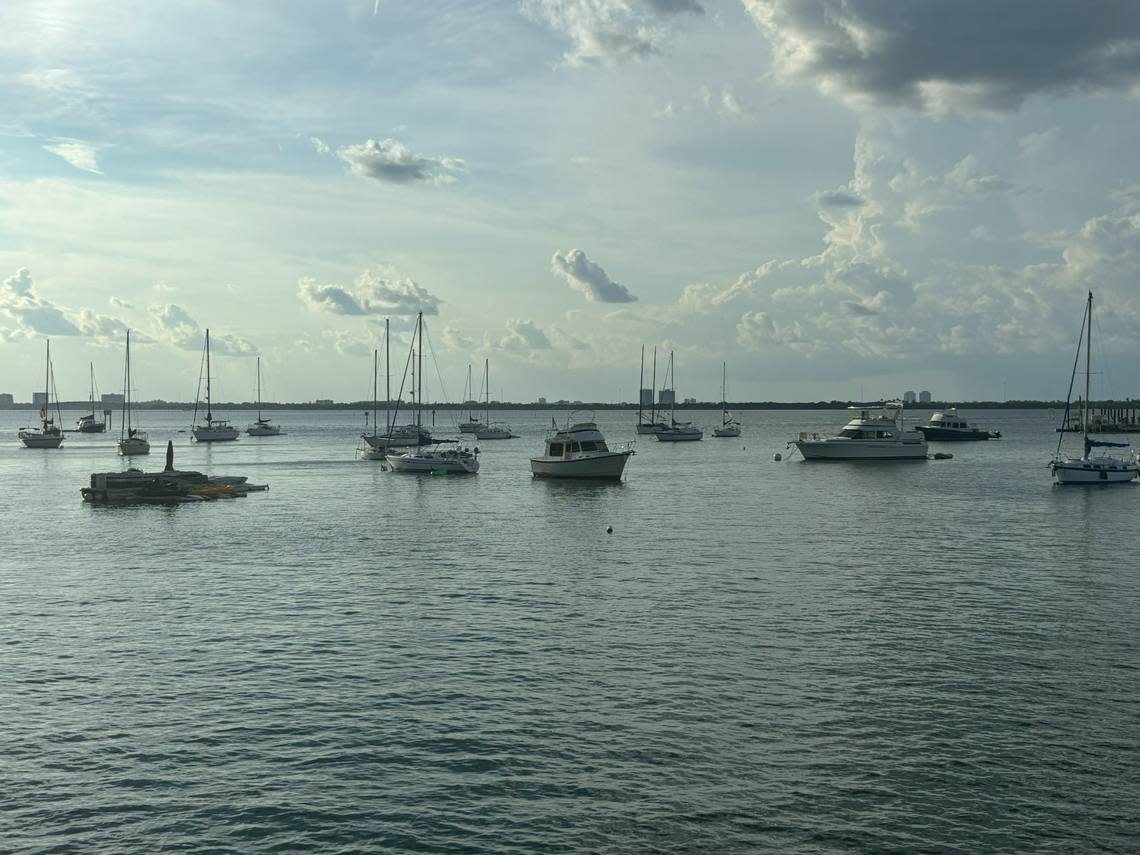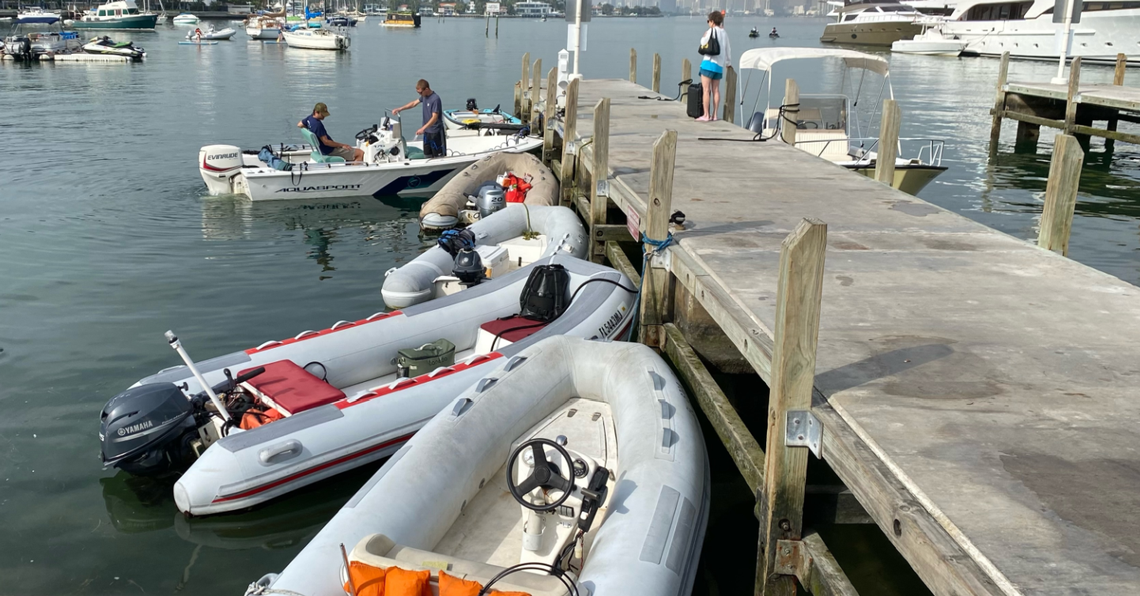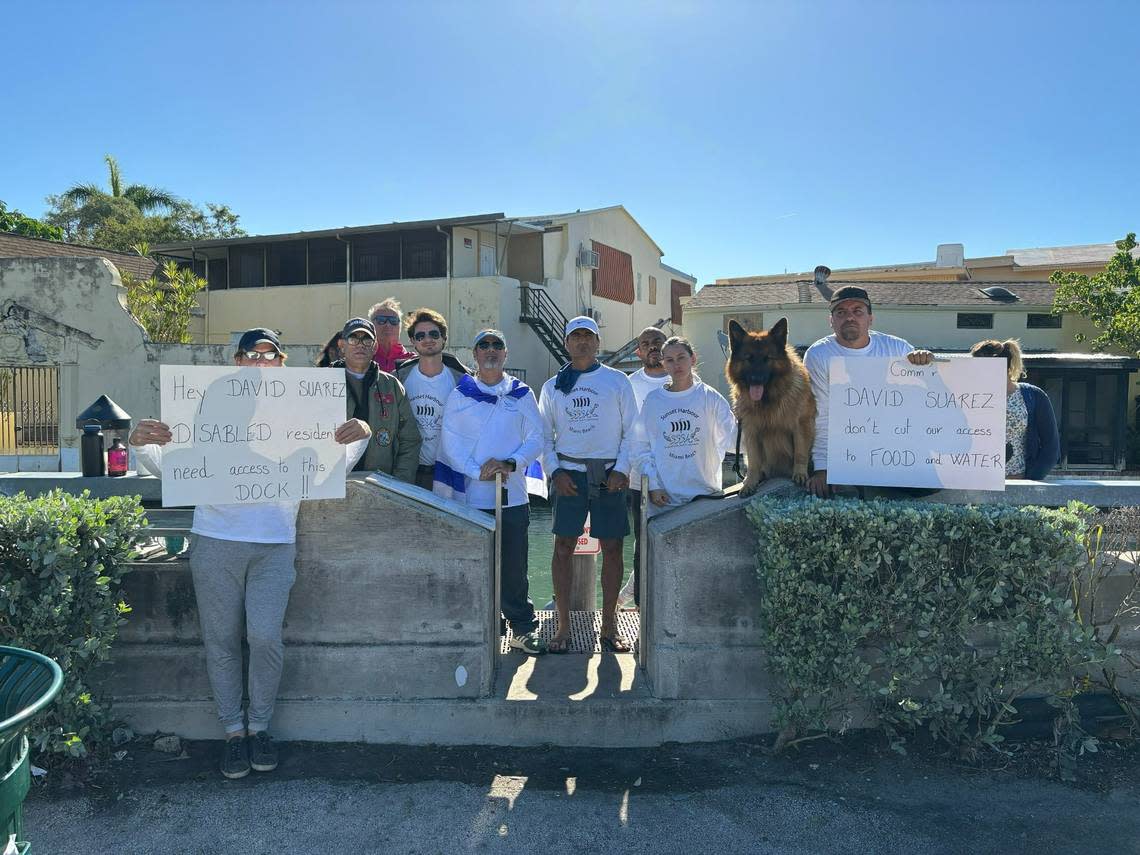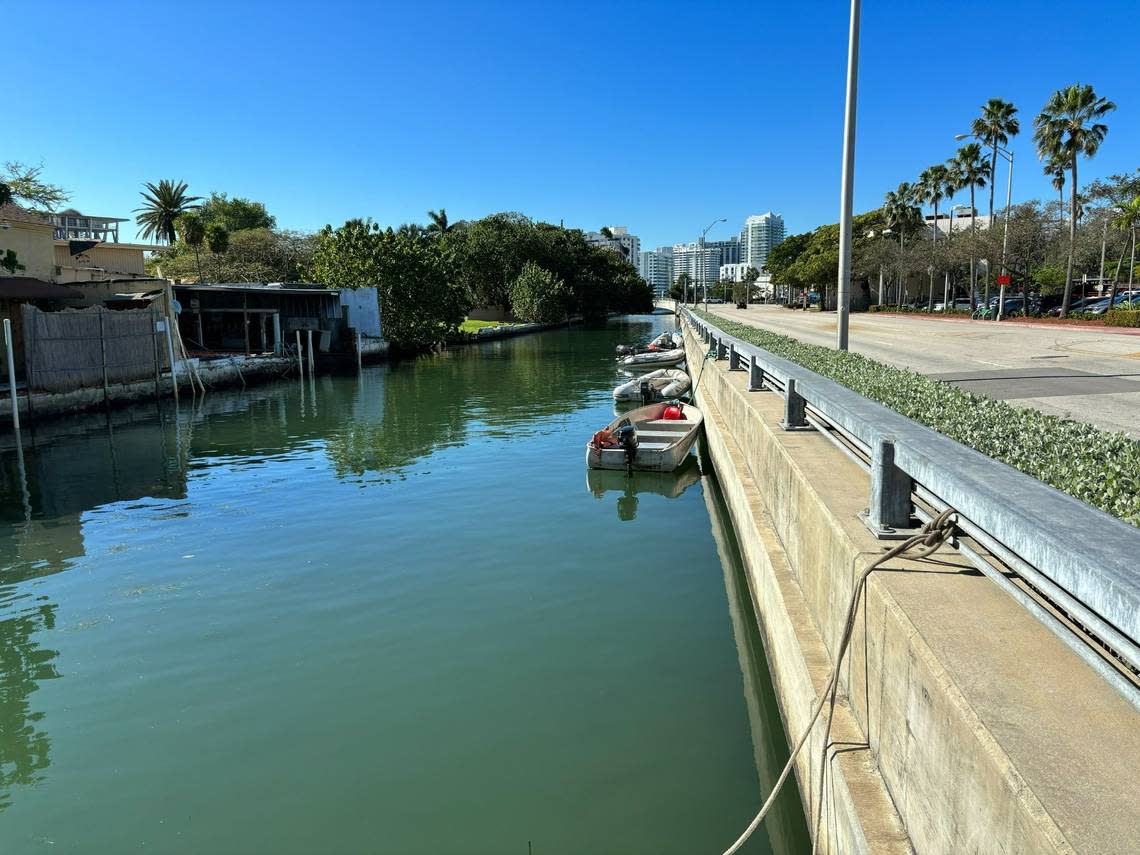Miami Beach enacts $1,000 fines at boat ramp as live-aboard crackdown escalates
In December, the city of Miami Beach cut off a lifeline for people who live on boats in Biscayne Bay when it removed a dock that they relied on to get food and water on shore. The goal, a city commissioner said at the time, was to “limit the amount of access of the people who live on these boats that come to the mainland.”
Now, the city has all but eliminated another access point for the community of about 100 live-aboards who anchor their sailboats in Sunset Harbour — the latest escalation in a battle between residents who say live-aboards pose a public nuisance and boat dwellers who say their civil rights are under attack.
A new ordinance, which received final approval from the City Commission late last month and took effect Aug. 3, declares that the boat ramp at Maurice Gibb Park in Sunset Harbour can only be used by city residents to “launch and retrieve noncommercial vessels” — not to dock boats, even temporarily, or pick up and drop off passengers.
Previously, motorized boats could dock at the ramp for 20 minutes. That time limit remains in place at a nearby floating dock for kayaks and paddleboards.
The law imposes steep penalties: $1,000 for a first offense, then $2,000 and $5,000 for a second and third offense, plus an option for criminal charges with up to 60 days in jail. The ordinance also calls for immediate towing of the offending boat, which can cost over $1,000 to retrieve from a private tow company.
The result has been a heightened sense of desperation and fear among live-aboards, many of whom had been relying on the Maurice Gibb ramp to tie up their dinghies and run quick errands following the December removal of a dock near Publix on Dade Boulevard about a half mile inland from Sunset Harbour.

Despite being legally anchored in Biscayne Bay, the boaters say their unique lifestyle is becoming increasingly untenable. In recent days, some have resorted to extreme measures to get to shore.
Carlos Leon, who organized the Miami Beach Boaters Association and has sparred for months with City Commissioner David Suarez over efforts to push live-aboards out of Miami Beach waters, has been anchoring his dinghy near Maurice Gibb Park and swimming to the floating dock while his wife Jana and their dog use a paddleboard.
In a video they shared with the Herald, a city code enforcement officer told Leon he had been at the ramp for more than 20 minutes and needed to leave.
“It may be legal, but is it humane?” Leon said of the city’s approach.
Elena Novikova, who has lived on a boat in Miami Beach with her husband and their daughter for nine years, said her family had been using the Maurice Gibb ramp for drop-offs and pickups from work and other tasks on shore.
Now, with drop-offs and pickups banned, Novikova said their only option is to tie up illegally along Collins Canal and climb the seawall. That has been a challenge for Novikova, who has a job on land and also lives with a 28-year-old daughter, Anastasia, who has Down syndrome.
“We have no space now for Anastasia to safely go to the shore,” she said. “Sometimes she just has to stay home.”

City goes after ‘boat squatters’
In May, Suarez pitched the Maurice Gibb Park proposal as a crackdown on commercial activity at the boat ramp. He presented video footage that showed boats frequently picking up and dropping off passengers on a Saturday, saying it was evidence of “constant illegal and unenforceable charter activities.”
Commercial uses of the boat ramp have been banned since 2016.
“This boat ramp was intended as a residential boat launch — not a marina, not a parking lot, and certainly not a pickup and a drop-off hub,” Suarez said at the May commission meeting, adding that there are other locations where people can pay to park their boats. “We all pay our way to live in Miami Beach,” he said.
Leon said at the May meeting that the change would have the biggest effect on live-aboards.
“The consequence is we can’t get to land now,” he said. “Where are we going to park?”
Suarez declined to discuss the ordinance with the Herald. But at public meetings and on social media, he has made the case that live-aboards — whom he refers to as “boat squatters” — damage seagrass with their boat anchors, pollute the bay by dumping human waste and disrupt quality of life for residents on land with noise and litter. He has also flagged concerns about abandoned, “derelict” boats that languish in the bay.
Many of the boaters have pushed back, saying they are good neighbors committed to rooting out bad actors. They have pointed to an enforcement effort earlier this year to investigate whether waste was being improperly disposed from the boats, which resulted in only two citations among 39 vessels tested.
They also cite data from the nonprofit Surfrider Foundation that shows Sunset Harbour has lower fecal matter concentration than most other areas of Biscayne Bay.
But Suarez has the backing of a vocal contingent of Miami Beach residents, including neighborhood associations for Sunset Harbour and West Avenue and others who have complained about boaters coming ashore at the west end of Lincoln Road.
Commissioner Laura Dominguez voted against the Maurice Gibb regulations on first reading in May, raising concerns about the amount of the fines and the prospect of penalizing boaters who “live legally in our waters.”
But she said that, while she initially sought a compromise with the boaters after the removal of the Publix dock in December, it has since become clear that residents support the crackdown. Dominguez voted for the Maurice Gibb ordinance on second reading July 24.
“Our residents on land have gotten behind this ordinance, so it makes it hard to fight for the people on the boats when the people that are paying property taxes, are voting, are here day in and day out are so passionately supporting this,” Dominguez said in an interview.
“I’m a compassionate person. I care about people,” she said. “This one was really, really tough.”
‘Feel like we’re being hunted’
The new rules and strict enforcement are increasing the physical and legal risks that live-aboards are taking to get to land, including parking their boats illegally, climbing over seawalls and hiding dinghies in bushes.
After the removal of the dock near Publix on Dade Boulevard in December, the city installed new signage and cameras to enforce a ban on docking at public seawalls.
“I feel like we’re being hunted,” said Barbie Wynn, a retired firefighter who has been living on a boat in Miami Beach for three years.
READ MORE: Boat dwellers protest as Miami Beach shuts down dock they use to go get food

Wynn said a friend has been dropping her off in a dinghy at the former site of the dock near Publix, where Wynn then climbs over the seawall and goes to get groceries.
But she said the new restrictions have prevented her from working part-time. Previously, she said, she worked at a TGI Fridays on Ocean Drive. After the Publix dock was removed, she sometimes resorted to sleeping on the Maurice Gibb Park dock when she got off work late and no one was available to pick her up.
“I don’t have anywhere to park my dinghy,” Wynn said. “It’s depressing. It’s hurtful. It makes you feel like you’re being discriminated against.”
Novikova said she feels “like a criminal” when she scales the Collins Canal seawall each day to go to work, defying “no trespassing” signs and “rangers and cameras everywhere to catch us.”
“Every time when I reach the shore, I just break the law,” she said.

In April, the live-aboards launched a GoFundMe campaign to hire a lawyer to sue the city for “violations of the Civil Rights Act of 1964, various state maritime laws” and the Americans with Disabilities Act. They have raised about $10,000 toward a $25,000 goal.
Andrew Dively, who lived on a boat in Miami Beach before recently moving to Jacksonville, said he believes the city is taking advantage of the boat dwellers’ lack of financial means.
The city knows “that the chances of the boaters having enough money to fight them in court is close to zero,” Dively said. “Their boat is one of the few things keeping them from being homeless on the streets of Miami.”
In 2016, as wealthy waterfront homeowners clashed with boaters anchored near the Sunset Islands, state law prohibited anchoring in certain areas of Miami Beach, including near the Sunset and Venetian islands. But boaters were still allowed to anchor in Sunset Harbour.
State legislation proposed earlier this year would have made it illegal to anchor within 200 yards of the shoreline, but that language was removed in the version that ultimately passed. For now, anchoring in Sunset Harbour remains legal.
Miami Beach officials have been working with the state to establish a mooring field, which would regulate, but not eliminate, anchoring in Sunset Harbour. But Dively said he questions whether that is the city’s true goal.
“A mooring field could be a humane solution if the city were to be reasonable with the fees,” he said. “But are you trying to build a mooring field? Or are you just trying to kick the boaters out?”






